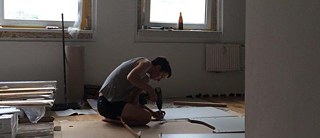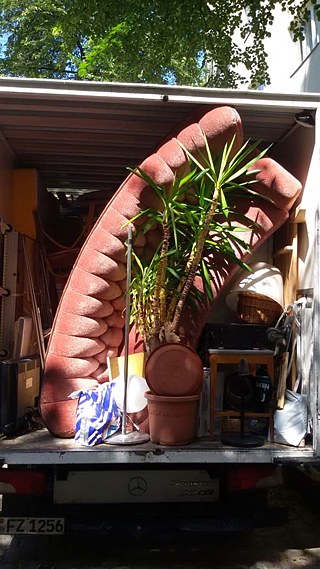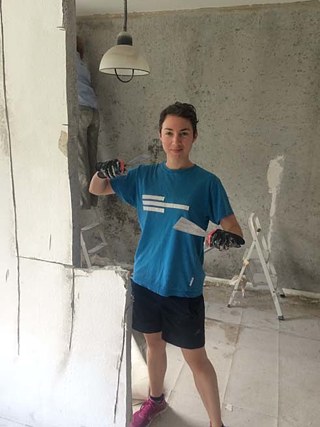Bicultural Urbanite Brianna
Escape from the rising rents: Buying property in Berlin

Berlin’s low cost of living is one of its major drawcards. The city is a bastion of affordability compared to many other Western European capitals. Creative young people flock here from all over the world to enjoy reasonable rent and 50 cent kiosk beers. They have launched businesses, opened galleries and generally made the city an ever-more appealing place to live. And consequently, a great place to invest. The resulting property boom has made life tougher for tenants, so I decided to get out of the rental game and into massive debt – by buying a flat.
In 2006 I was paying 280 Euro per month for a swimming pool-sized WG room in Prenzlauer Berg. These days, you’d be lucky to find a shoebox for 380 Euro. Between 2009 and 2015, the average rental price in Berlin’s most popular neighbourhoods virtually doubled. According to the Berliner Morgenpost, in Kreuzberg and Neukölln rent increased by 99 percent around Richardplatz, by 98 percent in the Rollberg Strasse neighbourhood and 93 percent near Görlitzer Park.
But it’s not all bad news. The lucky ones who had already found their dream flat before the madness began are still largely enjoying pre-boom rent. How? In Berlin, nearly all rental contracts are unlimited – unlike in Australia where one-year contracts and ludicrous price hikes are par for the course. This means that once you’ve signed the contract, you can usually look forward to long-term housing security and rent stability. Landlords can jack up prices, but the market is strictly regulated so that rent can only be raised by a certain margin above the average rental prices in your neighbourhood.
That said, anyone who had to move house after the property market went nuts has been forced to kiss goodbye to their affordable old rental contract and compete at overcrowded flat inspections for the privilege of paying Munich-style prices.

TO BUY OR NOT TO BUY
So when it became clear that my partner and I needed to move into a larger abode (his ever-expanding vinyl collection had become a rather unwieldy flatmate), we weighed up all our options. The cost of renting a three-room flat turned out to be nearly the same as mortgage repayments on a similarly sized property. I had been toying with the idea of buying a place for a while, despite my admiration for Germany’s progressive rental regulations and my desire to avoid becoming yet another 30-something-year-old Australian preoccupied with real estate. Obsession with home ownership, investment properties and ‘flipping’ houses are among the culprits of Australia’s ballooning property debacle – and similar forces are currently driving Berlin’s investment stampede. Although I was loathing to join the motley crew of foreign investors snapping up properties and turbocharging the market, it was hard to deny that buying a flat made the most sense financially.
The hunt for property began. Overwhelming demand and insufficient supply have turned Berlin’s inner east into the Wild West, with cowboy real estate agents riding roughshod over would-be buyers. I heard horror stories about people who were in the process of buying a flat – the bank was on board, a notary appointment scheduled – when the real estate agent completely rolled them by selling the place to someone else for a couple of extra grand.
BANKS, MAKLERS AND MORTGAGE BROKERS
Talking shop with real estate agents (Maklers) proved somewhat challenging, because my brain simply blanked out any technical German real estate terms I was unfamiliar with. Subsequently trying to relay these conversations to my non-German-speaking partner highlighted the gaps in my Fachsprache: “She said something about the balcony being a Sondereigentum, whatever that means, and apparently there’s Gasetagenheizung, so I think there’s heating on this floor of the building, although I have no idea why she bothered pointing that out…”
For the provision of their services – posting online ads and unlocking front doors – real estate agents in Berlin receive a handsome 7.14 percent commission on the purchase price. And this phenomenal fee is paid by the buyer. Yes. The seller benefits from the services and the buyer foots the bill. (To put this into perspective, when I did finally buy a place, I had to fork out an additional 14,000 Euro.)
My partner and I spent 18 months trawling property websites, inspecting run-down dumps and wrangling with banks, mortgage brokers and Maklers. I was offered several mortgages, only to have my applications rejected upon closer examination. Keeping the seller sweet while I organised reams of paperwork for the banks was a difficult balancing act. I became so accustomed to the never-ending red tape requests that I honestly wouldn’t have been surprised if a bank had asked for a notarised copy of my dental records. German banking regulations were tightened post-GFC and as a freelancing non-EU citizen buying a flat under her own steam, I was clearly considered too great a risk.

WHITE PEOPLE RENOVATING HOUSES
After much hoop-jumping I managed to seal the deal on a ‘renovator’s dream’. Luckily, my partner is a dream renovator. We started by gutting the place. We ripped out the kitchen, jackhammered the bathroom tiles and peeled back several layers of vintage-dated linoleum. Evenings and weekends were spent scratching off that Raufaser wallpaper filled with woodchips that the Germans seem to love. We even tore down the concrete wall between the kitchen and the living room to create an open-plan dining area.
Our lives became a reality TV show filled with concrete dust and trips to the tip, starring a rotating cast of mulleted electricians, hardware store staff and gobsmacked friends. This fact was hammered home when we were lampooned in a recent episode of South Park, in which Randy becomes the host of a TV series called White People Renovating Houses. Each property makeover essentially consists of removing the wall between the kitchen and the living room “for a more open concept, with lots of space to entertain”...
Despite living abroad for 11 years, I seem to have unwittingly subscribed to the Australian Dream. Ok, my three-room flat is hardly a quarter acre block, but now I’ve got my “foot in the market”. If I play my cards right, in 20 years I might just be able to afford the deposit on a garden shed in inner-city Melbourne.